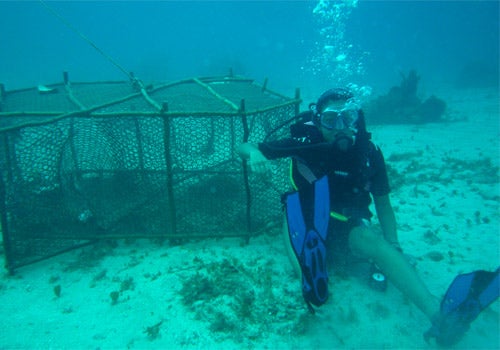
Efforts to preserve fish stocks affect well-being of fishing communities
Environment student is finalist in SSHRC storytelling competition for video about community well-being and marine protected areas

Environment student is finalist in SSHRC storytelling competition for video about community well-being and marine protected areas
By Dheana Ramsay Faculty of Environment
Cheryl Chan, a graduate student in the Faculty of Environment
Attempts to protect fish stocks in Jamaica are having a significant impact on the communities that have relied on fishing for generations, says a Waterloo researcher.
Cheryl Chan, a graduate student in Waterloo’s School of Environment, Resources and Sustainability (SERS), has created a video to explain how marine protected areas (MPAs) have impacted the well-being of people in Bluefield, Jamaica. Her research shows that some of the effects include conflict, food insecurity and mental health issues.
“Fishing is such a huge part of the culture,” Chan explained. “To say, ‘You can’t do this anymore’ not only takes away from people’s livelihoods, it also just really makes them question what their future is going to look like.”
Chan’s video has been selected as a finalist in the Social Sciences and Humanities Research Council (SSHRC) Storytellers competition. The competition invites post-secondary students from across Canada to explain, in 3-minutes or 300 words, how a SSHRC-funded research project is improving life for Canadians.
Chan, who was also a was runner up in the University’s 2016 3MT competition, said she enjoyed the challenge of pushing beyond her comfort zone. “I’d never done anything like this before, but I’d never done anything like the 3MT either. You just have to believe that you can do it.”
According to her graduate supervisor Derek Armitage, Chan’s well-being focus provides new insights into the relationships between people and protected areas that are important for planning and management. “Countries around the world, including Canada, are trying to protect 10% of their marine space by 2020,” he said. “Cheryl's research highlights how these efforts are not likely to be successful in the long-term without careful attention to the economic and social wellbeing of adjacent communities.”
The Storytellers competition challenges young researchers to clearly communicate the importance of their research in a creative, innovative and compelling fashion, using video, audio, text or an infographic.
“It is wonderful to see SSHRC send a clear signal to the next generation of researchers about the importance of sharing knowledge in ways that are accessible,” said Armitage. “And in ways that reflect the contributions of social scientists to the pressing challenges facing Canada.”
For making the Top 25 cut, Chan will receive a cash prize of $3000, an invitation to attend a research communications master class at Congress 2017 and an opportunity to present her work in front of a live audience at the Storytellers Showcase. If she is one of the top five presenters, she’ll be invited to the SSHRC Impact Awards this fall.
Previous Storytellers finalists from the University of Waterloo include Games Institute PhD candidate Steve Wilcox (2013), English PhD candidate Emma Vosen (2016) and SERS MES candidate Noori Khan (2016).

Read more
Here are the people and events behind some of this year’s most compelling Waterloo stories

Read more
The medal honours outstanding individuals across Canada who have made significant contributions to their communities

Read more
Waterloo welcomes emerging postdoctoral scholars to receive funding from Provost fellowship programs
The University of Waterloo acknowledges that much of our work takes place on the traditional territory of the Neutral, Anishinaabeg, and Haudenosaunee peoples. Our main campus is situated on the Haldimand Tract, the land granted to the Six Nations that includes six miles on each side of the Grand River. Our active work toward reconciliation takes place across our campuses through research, learning, teaching, and community building, and is co-ordinated within the Office of Indigenous Relations.